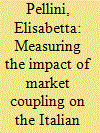|
|
|
Sort Order |
|
|
|
Items / Page
|
|
|
|
|
|
|
| Srl | Item |
| 1 |
ID:
169840


|
|
|
|
|
| Summary/Abstract |
The European Commission has set a target of establishing an integrated Europe-wide electricity market for day-ahead and intraday transactions. However, there are still many open questions on the potential benefits of a Europe-wide intraday market integration and the harmonizing market rules. This paper intends to provide a precise insight into the potential impacts of EU policies regarding integrating electricity markets on market efficiency and on different market players with the aim of supporting policy makers to increase the penetration of renewables in a cost efficient manner. In this paper, we investigate and compare the current option of regional intraday electricity market with the option of an integrated Europe-wide one, with reference to the three European test cases with high renewable penetration: the Iberian electricity market including Spain and Portugal, the Italian electricity market including Italy and Slovenia, and the electricity market of Germany. We consider two 2030 scenarios: (i) the regional/local intraday electricity market, and (ii) the integration of the current regional intraday market of the test cases into a single intraday market in Europe. The two scenarios are modelled through stochastic Monte Carlo simulation, considering uncertainty on electricity demand, wind and solar power. The performance of the intraday market under the two options are compared in terms of generation cost, electricity prices, producer’ surplus, and load expenditure inside the European test cases. The simulation results lead to the conclusion that integrating to a Europe-wide intraday electricity market is not advantageous for power producers inside the European countries with high share of variable renewable generation, in terms of annual generation surplus. However, from the customers’ point of view, intraday market integration is beneficial, leading to lower cost to loads. Furthermore, it is shown that the flexibility provided by the installed capacity of hydro pumped-storage generators within Europe, by 2030, eliminates the planned curtailment of renewable energy sources in day-ahead and intraday markets and confines the impact of market integration on the market performance indicators.
|
|
|
|
|
|
|
|
|
|
|
|
|
|
|
|
| 2 |
ID:
177475


|
|
|
|
|
| Summary/Abstract |
Interconnectors reduce the cost of supplying electricity if they are operated efficiently. We show that established metrics which are used to monitor electricity trading inefficiency are inaccurate for several typical trading conditions. We propose two new metrics—the Unweighted and Price-Weighted Inefficient Interconnector Utilisation indices—to address these deficiencies. These metrics are substantially more accurate than existing ones and perform equally well whether or not interconnected markets have coupled trading. Our analyses show a substantial decrease in inefficient trading between Great Britain (GB) and both France and the Netherlands after the European Union's market coupling regulations were introduced in 2014.
|
|
|
|
|
|
|
|
|
|
|
|
|
|
|
|
| 3 |
ID:
115132


|
|
|
|
|
| Publication |
2012.
|
| Summary/Abstract |
This paper evaluates the impact on the Italian electricity market of replacing the current explicit auction mechanism with market coupling. Maximising the use of the cross-border interconnection capacity, market coupling increases the level of market integration and facilitates the access to low-cost generation by consumers located in high-cost generation countries. Thus, it is expected that a high-priced area such as Italy could greatly benefit from the introduction of this mechanism. In this paper, the welfare benefits are estimated for 2012 under alternative market scenarios, employing the optimal dispatch model ELFO++. The results of the simulations suggest that the improvement in social surplus is likely to be significant, especially when market fundamentals are tight.
|
|
|
|
|
|
|
|
|
|
|
|
|
|
|
|
| 4 |
ID:
168652


|
|
|
|
|
| Summary/Abstract |
Interconnectors have value for Britain, providing access to cheaper Continental power, security of supply, and managing increased renewables, prompting proposals for substantial new interconnectors. The EU Target Electricity Model requires interconnector market coupling via Day Ahead and IntraDay Markets. We examine the efficiency and value of uncoupled and coupled trading for the four DC interconnectors to GB, over different timescales from year ahead to intraday, and the social costs and benefits not reflected in the private benefits. Because the GB carbon tax is not replicated abroad it transfers some €65 m./yr to the foreign interconnector part-owners and creates distortions when trade flows change. IFA and BritNed have a commercial value of about €500 million/yr, create additional infra-marginal surplus of €25 m./yr, but suffer €30 m./yr deadweight loss from the asymmetric GB carbon tax. The island of Ireland was coupled in Oct 2018, dramatically reducing trading inefficiency. While further investment in interconnectors appears socially profitable, it is important to harmonise carbon taxes across the EU. If GB leaves the EU and is uncoupled, some of these trading gains would be sacrificed, but other financial markets may alleviate the cost of Brexit, making policies to enhance liquidity desirable.
|
|
|
|
|
|
|
|
|
|
|
|
|
|
|
|
|
|
|
|
|